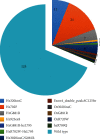Long-Term Follow-Up, Association between CARD15/NOD2 Polymorphisms, and Clinical Disease Behavior in Crohn's Disease Surgical Patients
- PMID: 33708009
- PMCID: PMC7932801
- DOI: 10.1155/2021/8854916
Long-Term Follow-Up, Association between CARD15/NOD2 Polymorphisms, and Clinical Disease Behavior in Crohn's Disease Surgical Patients
Abstract
Background: CARD15/NOD2 is the most significant genetic susceptibility in Crohn's disease (CD) even though a relationship between the different polymorphisms and clinical phenotype has not been described yet. The study is aimed at analyzing, in a group of CD patients undergoing surgery, the relationship between CARD15/NOD2 polymorphisms and the clinical CD behavior after a long-term follow-up, in order to identify potential clinical biomarkers of prognosis.
Methods: 191 surgical CD patients were prospectively characterized both for the main single nucleotide polymorphisms of CARD15/NOD2 and for many other environmental risk factors connected with the severe disease form. After a mean follow-up of 7.3 years, the correlations between clinical features and CD natural history were analyzed.
Results: CARD15/NOD2 polymorphisms were significantly associated with younger age at diagnosis compared to wild type cases (p < 0.05). Moreover, patients carrying a 3020insC polymorphism presented a larger Δ between diagnosis and surgery (p = 0.0344). Patients carrying an hz881 and a 3020insC exhibited, respectively, a lower rate of responsiveness to azathioprine (p = 0.012), but no difference was found in biologic therapy. Finally, the risk of surgical recurrence was significantly associated, respectively, to age at diagnosis, to familial CD history, to diagnostic delay, to arthritis, and to the presence of perioperative complications.
Conclusions: 3020insC CARD15 polymorphism is associated with an earlier CD onset, and age at CD diagnosis < 27 years was confirmed to have a detrimental effect on its clinical course. In addition, the familiarity seems to be connected with a more aggressive postoperative course. Finally, for the first time, we have observed a lower rate of responsiveness to azathioprine in patients carrying an hz881 and a 3020insC.
Copyright © 2021 Francesco Giudici et al.
Conflict of interest statement
The authors declare that they have no competing interests.
Figures


References
MeSH terms
Substances
LinkOut - more resources
Full Text Sources
Other Literature Sources
Medical

